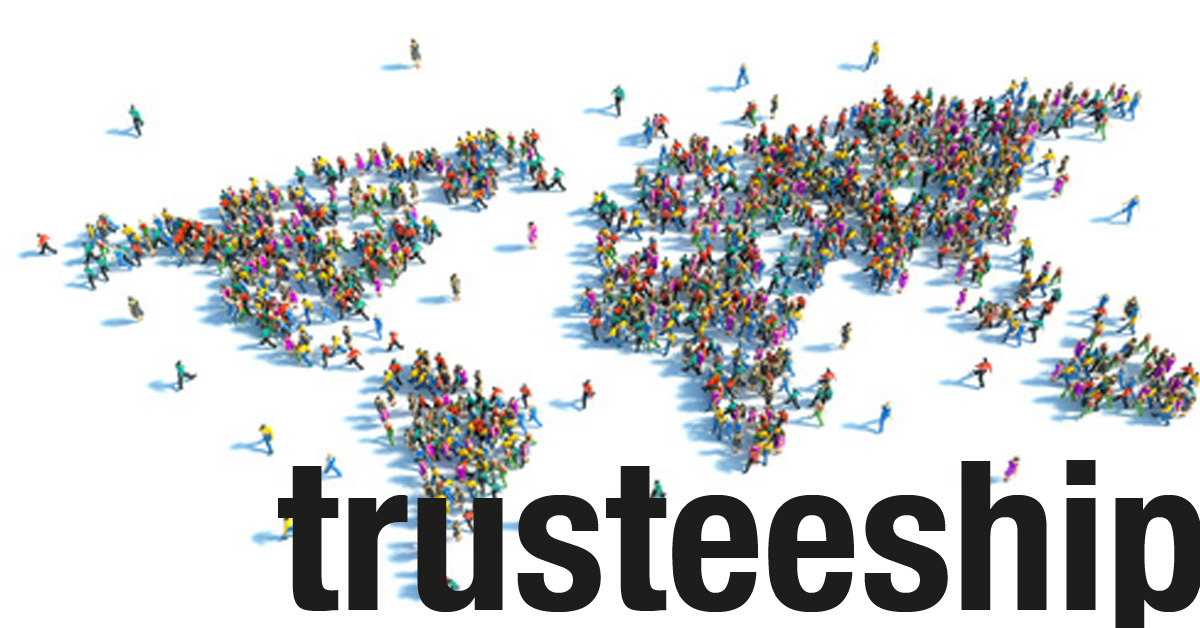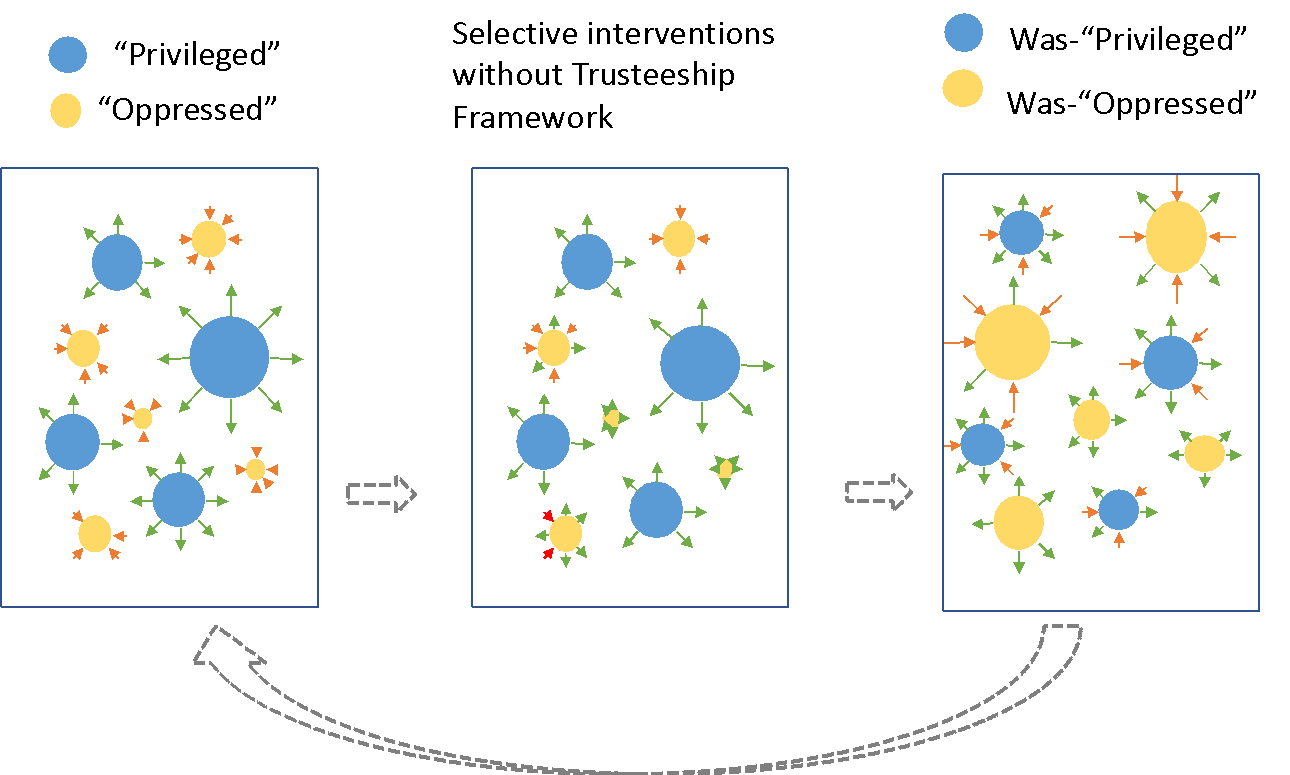
Gandhi predicted that both capitalism and communism would eventually fail.1 He proposed a third way, called trusteeship,2 which holds tremendous promise. Yet today’s world is more complex than the one that Gandhi inhabited, and so we need new technologies guided by a renewed mindset to navigate the maze of the complex adaptive system that characterizes our cultural, economic, and political reality.
To do so, we must begin by discussing thoughtfully, realistically, and compassionately how we can take responsibility for our children, for our planet, and for ensuring a human future, understanding how local actions lead to global effects, and vice versa. The scope of the challenges we face, the shortcomings of current systems, and the unprecedented power of technology require us to examine all alternatives. We will need our best thinking, most advanced tools, and unprecedented levels of cooperation.
Trusteeship, along with the related caring economy movement3, may hold solutions for the challenges shared by everyone on our small planet. They can guide our thinking about how we put to use our most powerful technological tools to help us avoid what author Riane Eisler calls “the problem of really high technology guided by an ethos of domination,4” rather than partnership.
Let’s start where seven-and-a-half billion humans generally agree: it is important to provide for our children and to nurture and improve our communities. We want lives that are healthy, productive, and safe – for us and for generations to come.
Most humans also share increasing anxiety about political uncertainty, fear of our neighbors, distrust of institutions. We fear technology’s impact on jobs since machines can progressively replace humans with better efficiency and productivity. Natural, familial, societal, political, commercial and technological systems are in flux as never before.
Yet we stand at a threshold of possibility as great as our challenges are daunting.
The Case for a New Ism
It is time to reimagine how we measure and think about wealth and what it can enable: today we have the knowledge, tools and understanding needed to build systems that address our challenges and truly make all of humanity wealthy.
Our dominant economic systems—capitalism and socialism—produce great wealth but leave many behind. Communism, fascism, theocracy, monarchy, democracy: none have yet produced equity. And inequity is the greatest driver of violence and revolution historically, as well as the source of populist rumblings worldwide today. Yet Gandhi understood that simply redistributing wealth by force would fail, correctly foreseeing that, according to Gandhi scholar Rajni Bakshi, “the takeover of all private property by the State would not necessarily end exploitation or injustice.”5
Trusteeship proposes a framework for enabling a sustainable future. It addresses systemic flaws of unfettered but directionless capitalism, which otherwise create poverty and environmental destruction in the process of creating wealth. Trusteeship also rejects communism, recognizing the need for incentives to encourage and reward hard work.
As Gandhi said in 19426, “We do not want to produce a dead equality where every person becomes or is rendered incapable of using his ability to the utmost possible extent. Such a society must ultimately perish.”
By distinguishing commerce from capitalism, Gandhi argued, we can redefine success based on multi-dimensional values that go beyond financial accumulation and include stewardship of private wealth for the betterment of all people.
His concept underlies the concept of a caring economy, which includes the value created by raising and educating healthy children, caring for the environment, and bettering communities.
Both ideas rest on the knowledge that improving people’s lives provides strong return on investment according to all measures of wealth. As a result, and by choice, the wealthy will dedicate a meaningful proportion of their wealth to improving the greatest number of lives.
But how to identify and choose those endeavors? Simply giving money away is no longer enough.
Using AI and DI to further trusteeship
Today’s world is considerably more complex than the one in which Mahatma Gandhi lived. Simple wealth transfers through philanthropy do not necessarily address the underlying causes of inequity, and can result in zero or even negative value. As illustrated below, selective interventions on few key indicators without a holistic guiding framework offer temporary respite but keep humanity in a vicious cycle of privileged and oppressed.

Today’s forces of globalization, automation and digitization accelerate digital technologists to increasingly replace the older order of power and wealth generators. As we embark into the third decade of the World Wide Web Sir Tim Berners-Lee points out that “companies […] have been built to maximize profit more than to maximize social good7”.
Trusteeship remains, as it overcomes inequity, but navigating this new landscape is a challenge. We can use technologies like Artificial Intelligence8(AI), along with its newer cousin, Decision Intelligence9(DI), which links multiple AI systems, to limit systemic regress coming from a task-centric economy mindset.
Applying trusteeship to this emerging digital society calls for checks and balances that keep the underlying algorithms fair and putting in place redressal models in case of unintended harm10. Barbara Fredrickson’s broaden-and-build11 yardstick to increase positive emotions like joy, interest, commitment and love puts humanity at the center of future digital enterprises. In our emerging digital society trusteeship offers hope as a unifying framework for economic, social and personal world where every netizen can be individually served based on their digital footprint with full transparency, security and trust.
The way forward
Understanding the multiple links in complex political/social/technical/economic systems requires deep understanding and a shift in thinking that some might call “wisdom enhancement”. 12 This is possible, indeed, it is essential. It has been shown that a small group of “relentless” individuals can effect widespread change.13 The way forward is through a deep understanding of modern trusteeship and with the assistance of data and evidence in support of sophisticated, transparent advanced technology models that everyone can understand.
About the author:
Senior Vice President and Head of Globalization Services at SAP
This article is one in a series related to the 10th Global Peter Drucker Forum, with the theme management. the human dimension, taking place on November 29 & 30, 2018 in Vienna, Austria #GPDF18
This article was first published in LinkedIn Pulse
4 https://static1.squarespace.com/static/5ad1295f8ab722d5d35a4921/t/5b325e97562fa777f23e6024/1530027673279/Riane_Eisler_Transcription.pdf
5 http://www.gatewayhouse.in/wp-content/uploads/2016/09/FINALEdit_-Rajni_-Trusteeship_9March16-PDF.pdf
10 https://webfoundation.org/research/white-paper-series-opportunities-and-risks-in-emerging-technologies/

